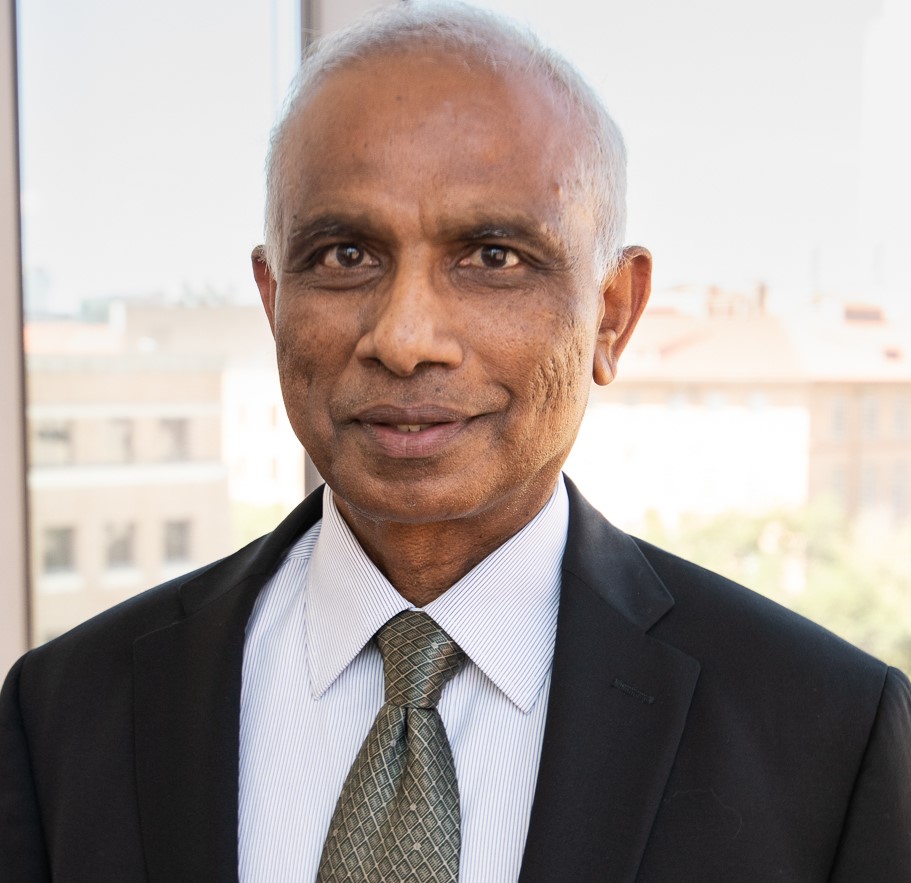Arumugam Manthiram will be the inaugural recipient of an award from the Electrochemistry Society named for his long-time colleague and collaborator John B. Goodenough.
The Goodenough award was first announced at a 100th birthday celebration for the battery luminary at The University of Texas at Austin earlier this year. It celebrates distinguished contributions to the fundamental and technological aspects of electrochemical materials science and engineering.

“I am humbled to be the first recipient of this great honor bearing John’s name,” said Manthiram, a professor in the Cockrell School of Engineering’s Walker Department of Mechanical Engineering. “Without the opportunity to join John at Oxford University from India and then to move with him to UT Austin, my life and career would have been entirely different. I am very grateful for his mentoring over the years and the confidence he had in me.”
Manthiram has made important contributions to the field, including pioneering fundamental and technological discoveries in electrochemical energy conversion and storage, the development of new materials, advanced characterization, structure-property-performance relationships, and prototype devices. He has worked alongside Goodenough for more than 35 years.
“The Electrochemical Society is honored to bestow the first ECS Goodenough Award to Professor Arumugam Manthiram, a dedicated member and supporter of ECS, renowned for his exceptional scientific contributions and superior teaching,” said Christopher Jannuzzi, ECS Executive Director and Chief Executive Officer. “This tribute is especially fitting given Arumugam’s long-term relationship with Prof. Goodenough. From serving as a postgraduate researcher with Prof. Goodenough at Oxford University in 1985, to delivering the 2019 Chemistry Nobel Prize Lecture in Stockholm on John’s behalf, this award is a wonderful tribute to their enduring collaboration.”
Arumugam joined Goodenough’s team after obtaining his Ph.D. from the Indian Institute of Technology Madras and working as a lecturer in chemistry in India for four years. He worked with Goodenough for less than a year at Oxford before the team moved to UT Austin in 1986. Soon after coming to the Forty Acres, they made numerous discoveries related to high-temperature superconductors based on copper oxides, while also pursuing electrode materials for lithium-ion batteries. During that period, they discovered the polyanion oxide family of electrodes for lithium-ion batteries, which is one of the three families of cathodes available to date for practical lithium-ion batteries. The polyanion oxide family offers electrode materials with better safety and inexpensive metals like iron, which is becoming more and more critical from a sustainability and supply chain point of view for electric vehicles and grid storage of electricity.
The overall theme of Manthiram’s research over the years is development of sustainable battery chemistries and technologies with a fundamental understanding of the complex and rich intricacies involved with battery materials. In addition to his research, Manthiram served as director of the Texas Materials Institute and the Materials Science and Engineering Graduate Program for 11 years.
Prof. Manthiram has 20 issued patents and authored more than 900 journal articles with more than 98,000 citations and an h-index of 155. A Web of Science Highly Cited Researcher every year since 2017, he is an elected Fellow of The Electrochemical Society (ECS), Royal Society of Chemistry, Materials Research Society, American Ceramic Society, American Association for the Advancement of Science, and World Academy of Materials and Manufacturing Engineering, and elected academician of the World Academy of Ceramics. He received the 2021 ECS Battery Division Technology Award; 2020 ECS Henry B. Linford Award for Distinguished Teaching; 2020 International Battery Association Research Award; 2018 Da Vinci Award; 2016 Billy and Claude R. Hocott Distinguished Centennial Engineering Research Award; 2015 Indian Institute of Technology Madras Distinguished Alumnus Award; 2014 ECS Battery Division Research Award; 2012 University of Texas Outstanding Graduate Teaching Award, and other awards.
